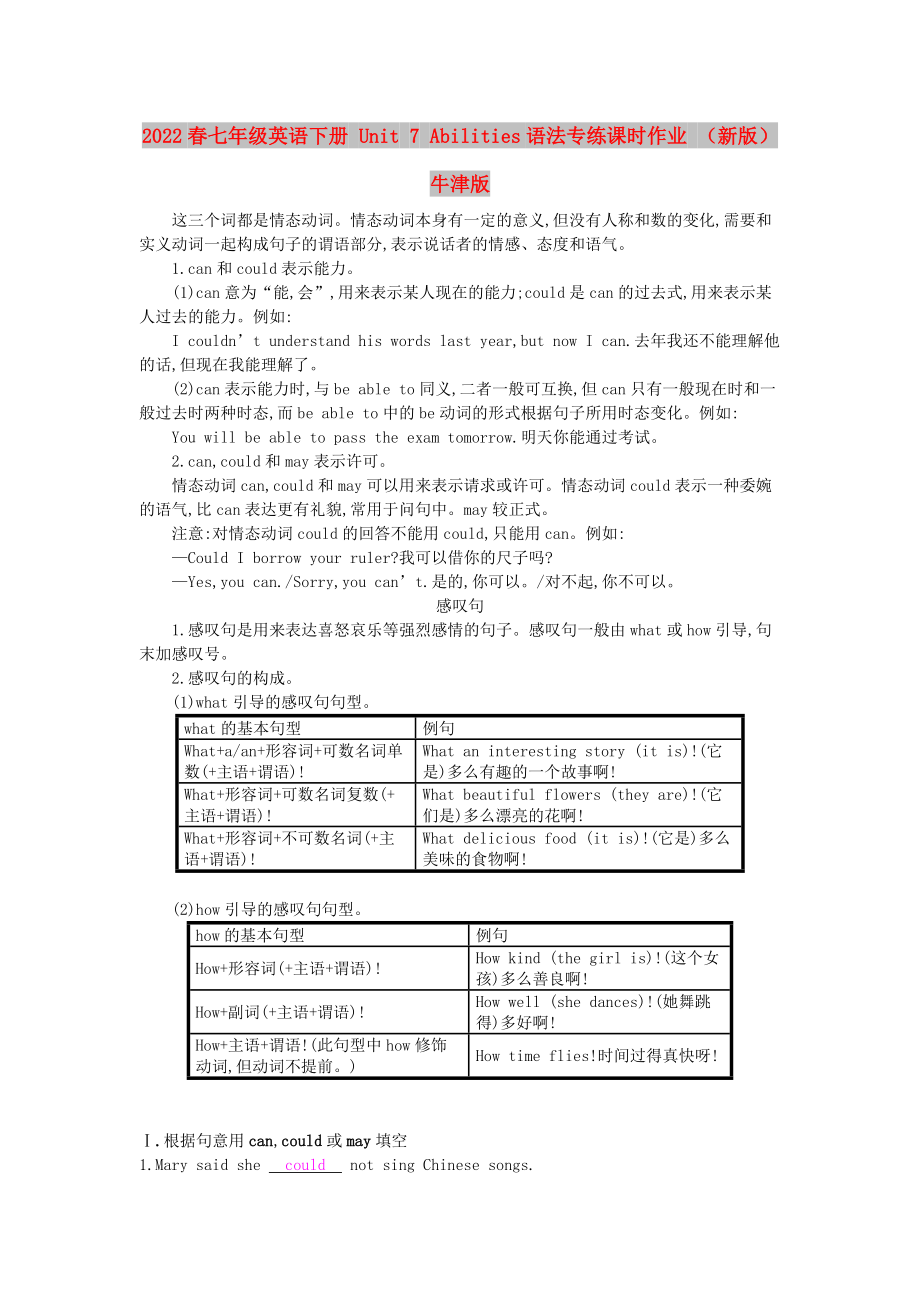《2022春七年級(jí)英語下冊(cè) Unit 7 Abilities語法專練課時(shí)作業(yè) (新版)牛津版》由會(huì)員分享,可在線閱讀�,更多相關(guān)《2022春七年級(jí)英語下冊(cè) Unit 7 Abilities語法專練課時(shí)作業(yè) (新版)牛津版(2頁珍藏版)》請(qǐng)?jiān)谘b配圖網(wǎng)上搜索。
1�、2022春七年級(jí)英語下冊(cè) Unit 7 Abilities語法專練課時(shí)作業(yè) (新版)牛津版
這三個(gè)詞都是情態(tài)動(dòng)詞。情態(tài)動(dòng)詞本身有一定的意義,但沒有人稱和數(shù)的變化,需要和實(shí)義動(dòng)詞一起構(gòu)成句子的謂語部分,表示說話者的情感�����、態(tài)度和語氣�。
1.can和could表示能力。
(1)can意為“能,會(huì)”,用來表示某人現(xiàn)在的能力;could是can的過去式,用來表示某人過去的能力���。例如:
I couldn’t understand his words last year,but now I can.去年我還不能理解他的話,但現(xiàn)在我能理解了��。
(2)can表示能力時(shí),與be able to同義,二者
2�����、一般可互換,但can只有一般現(xiàn)在時(shí)和一般過去時(shí)兩種時(shí)態(tài),而be able to中的be動(dòng)詞的形式根據(jù)句子所用時(shí)態(tài)變化�。例如:
You will be able to pass the exam tomorrow.明天你能通過考試�����。
2.can,could和may表示許可。
情態(tài)動(dòng)詞can,could和may可以用來表示請(qǐng)求或許可��。情態(tài)動(dòng)詞could表示一種委婉的語氣,比can表達(dá)更有禮貌,常用于問句中。may較正式��。
注意:對(duì)情態(tài)動(dòng)詞could的回答不能用could,只能用can����。例如:
—Could I borrow your ruler?我可以借你的尺子嗎?
—Yes,you
3�、can./Sorry,you can’t.是的,你可以��。/對(duì)不起,你不可以�����。
感嘆句
1.感嘆句是用來表達(dá)喜怒哀樂等強(qiáng)烈感情的句子。感嘆句一般由what或how引導(dǎo),句末加感嘆號(hào)��。
2.感嘆句的構(gòu)成�。
(1)what引導(dǎo)的感嘆句句型。
what的基本句型
例句
What+a/an+形容詞+可數(shù)名詞單數(shù)(+主語+謂語)!
What an interesting story (it is)!(它是)多么有趣的一個(gè)故事啊!
What+形容詞+可數(shù)名詞復(fù)數(shù)(+主語+謂語)!
What beautiful flowers (they are)!(它們是)多么漂亮的花啊!
What
4�、+形容詞+不可數(shù)名詞(+主語+謂語)!
What delicious food (it is)!(它是)多么美味的食物啊!
(2)how引導(dǎo)的感嘆句句型。
how的基本句型
例句
How+形容詞(+主語+謂語)!
How kind (the girl is)!(這個(gè)女孩)多么善良啊!
How+副詞(+主語+謂語)!
How well (she dances)!(她舞跳得)多好啊!
How+主語+謂語!(此句型中how修飾動(dòng)詞,但動(dòng)詞不提前����。)
How time flies!時(shí)間過得真快呀!
Ⅰ.根據(jù)句意用can,could或may填空
1.Mary sa
5、id she could not sing Chinese songs.?
2.I have six dogs.You can/may choose any of them.?
3.The little boy could not swim very well at the age of eleven.?
4.The boy can not be Jack.He has gone to China with his parents.?
5.—Where is my card?
—I don’t know.It may be in your bag.?
Ⅱ.單項(xiàng)填空
6�、
(C)1.—Could we picnic here?
— .Have a nice time.?
A.Yes,you could B.No,you couldn’t
C.Yes,you can D.No,you can’t
(D)2.—Pauline has lost her phone.
—No.It’s in her bag.I hear it.?
A.must B.shall
C.may D.can
(B)3.— interesting the film is!?
—Yes.I have seen it twice.
A.What B.How
7��、
C.What an D.How an
(A)4. delicious these beef noodles are!?
A.How B.What
C.What a D.How a
(B)5. sunshine!Shall we take a walk in the garden??
A.What a beautiful B.What beautiful
C.How a beautiful D.How beautiful
Ⅲ.按要求完成句子,每空一詞
1.I can speak English.(改為一般疑問句,并作否定回答)
— Can you speak English??
— No ,I can’t .?
2.The old man could ride a horse.(改為同義句)
The old man was able to ride a horse.?
3.The food is very nice.(改為感嘆句)
What nice food it is!?
4.This movie is very interesting.(改為感嘆句)
How interesting this movie is!?
 2022春七年級(jí)英語下冊(cè) Unit 7 Abilities語法專練課時(shí)作業(yè) (新版)牛津版
2022春七年級(jí)英語下冊(cè) Unit 7 Abilities語法專練課時(shí)作業(yè) (新版)牛津版

